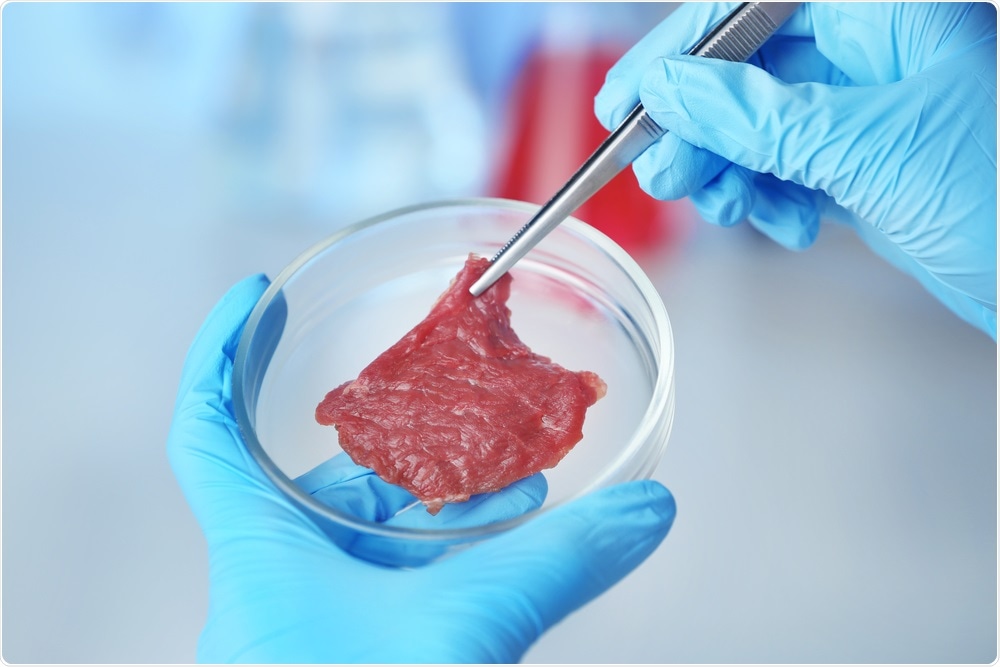Meat alternatives that are already at an advanced stage of development could be the solution to the high socioeconomic impact of zoonotic diseases such as SARS, avian flu, or African swine fever (the most recent outbreak of which occurred in 2019).

Image Credit: Africa Studio/Shutterstock.com
Although there is as yet no official confirmation, this type of infectious disease, caused by a pathogen that jumps from animals to humans, could be the origin of the COVID-19 outbreak which has resulted in the current pandemic, according to different sources of scientific information.
Food safety has become even more relevant, if that is possible, these days, and in this respect, cultured meat is one of the great breakthroughs that can help to tackle animal origin epidemics of this type.
Due to its preparation process, cultured meat is developed in an entirely safe biological environment. This is meat which is food-risk free as a careful selection is made of the cells extracted from the animal, which are developed in a virus-free biological environment. With this biotechnological progress, the risk of contamination by zoonotic diseases is exponentially reduced, thus becoming a safe alternative to traditional farming.
The problem of wet markets and zoonosis is only part of the broader issue of outbreaks of zoonotic diseases related to the global meat industry.
The "Plant-based and Cultured Meat 2020-2030" report from consultancy firm IDTechEx explores the rapid growth of this alternative model of meat production and its potential for reducing the world's dependency on the controversial intensive farming of animals destined for food.
The fact is that any system which involves an extremely high density of animals in contact with human beings entails a risk of disease transmission. Specifically, the systems for intensive farming involving animals, between which there is often little genetic diversity, facilitate a disease’s ability to spread quickly without encountering resistance.
In addition, cultured meat could help to solve not only the problem of animal epidemics linked to the traditional meat industry but also other environmental and ethical issues such as animal slaughter and high natural resource consumption.
The impact of Covid-19 on the global food industry
The Covid-19 pandemic has affected all areas of society, including the global food system. This public health crisis has also affected chains of production and food distribution, giving rise to a certain shortage of products in some international markets.
In this context, the future of the alternative proteins additionally represents a way to diversify traditional meat production systems. According to the latest report from the Good Food Institute, alternative proteins such as cultured meat “are poised to flourish postCovid-19”.
In their global analysis of the state of the cultured meat industry, the experts from the GFI discuss the investments, competitive landscape, consumer perceptions, and scientific progress in this fast-growing and transforming sector.
Ethicameat: pioneer in Spain and global benchmark in pork protein
The revolution of ´cultured meat’ is already a proven model worldwide and Spain is among the few countries with business projects making progress in scaling up production to begin commercialization, together with the United States, the Netherlands, and Israel.
The first Spanish company to enter this market, with a proprietary model focussing on pork, is privately owned Biotech Foods from San Sebastian, which continues to move towards the launch of its ‘Ethicameat’ cultured meat. Once the European regulation contained in the catalog of ‘novel foods’, that is, innovative food, from the European Commission has been fulfilled, cultured meat will be available for the end consumer.
Ethicameat is the first Spanish brand of cultured meat and one of the first worldwide to work with pork cells. The impact of the commercialization of its products in the next few years may imply limiting livestock and therefore the effects of any as-yet-incurable animal diseases, such as African swine fever.
Furthermore, it will contribute to a dramatic reduction in consumption of the natural resources used to rear livestock (water, land, energy, etc.) and, accordingly, to the fight against climate change.
The increasing demand for meat to feed a growing global population needs alternatives which avoid the necessity of depending solely on intensive farming. Reducing the world's dependence on the livestock-raising industry is key in environmental terms as well.
The alternative protein industry and, specifically, the culture meat industry, therefore, represents an opportunity to minimize the risk of infection between animals, their slaughter, and the corresponding squandering of natural resources.
Thanks to biotechnology, consumers will have within their reach a product that is rich in proteins, 100% natural and nutritional and, what’s more, is environmentally friendly.